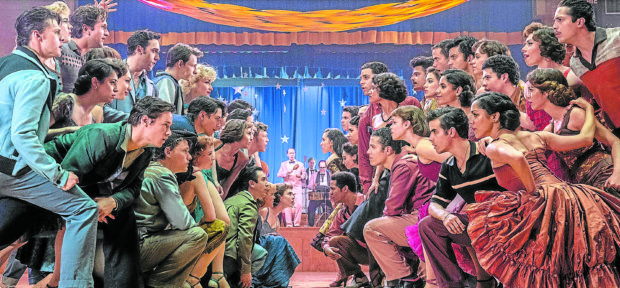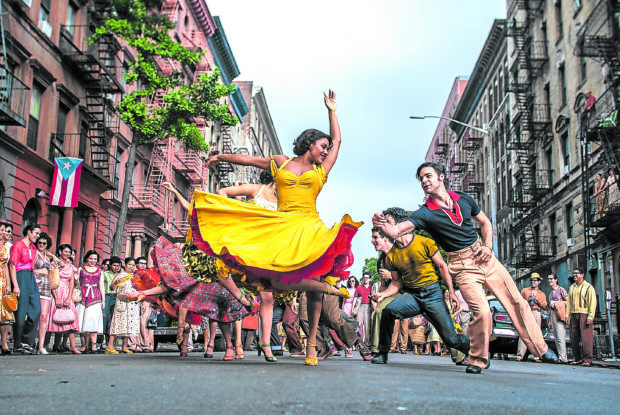Steven Spielberg on reimagining ‘West Side Story’: The rage and hatred had to be more pronounced

Ariana DeBose (left) as Anita and David Alvarez as Bernardo
First of two parts
If it ain’t broke, don’t fix it. For any filmmaker worth his salt, such is wise advice that’s best heeded, particularly if you’re thinking of reviving a well-loved movie musical that won 10 of its record-breaking 11 Oscar nominations. That’s exactly the astounding feat Robert Wise and Jerome Robbins’ “West Side Story” managed to accomplish 61 years ago.
But Steven Spielberg isn’t one of cinema’s most iconic and innovative directors for nothing. In true auteur fashion, his remake of “West Side Story” didn’t just get a smashing 92-percent approval rating on Rotten Tomatoes with nothing to show for it.
With the seven Oscar nods his version of the musical got last Tuesday (including one for best picture), the 75-year-old director broke the tie he held with the similarly legendary Martin Scorsese to become the first person in the history of the Academy to receive best director nominations across six different decades.
The next hurdle for Spielberg’s production to clear is the fact that it’s been exactly 20 years since a screen musical—that’s Rob Marshall’s “Chicago”—won best picture at the Oscars. But if the well-loved 1961 film triumphed in its category despite its flaws, we don’t see why Spielberg’s heartwarming update of it can’t prove its naysayers wrong again.
Article continues after this advertisementFilipino moviegoers can finally see for themselves if Spielberg’s “West Side Story” does indeed live up to film aficionados’ almost impossible expectations when the much-anticipated screen musical opens in Philippine cinemas this Wednesday, just in time for the Valentine week.
Article continues after this advertisementLast November, we rewatched the 1961 classic the night before we saw Spielberg’s version on the big screen. The following day, we were only too thrilled to tell “Steven”—as the director preferred to be addressed in our virtual interview with him and his lead stars, Rachel Ziegler (Maria) and Ansel Elgort (Tony)—how much we were swept off our feet by his reverential treatment of the Leonard Bernstein-Stephen Sondheim musical.
We were even more in awe of the way Spielberg has managed to subtly “fix” and “clarify” character motivations in scenes that proved to be problematic for us in the original film.
Thanks to screenwriter Tony Kushner, the film manages to consolidate a string of pertinent themes fleshed out further by providing more social context for the gang war that would soon erupt between the Jets and the Sharks. At the heart of this racially charged conflict is the forbidden romance that blossoms between its star-crossed lovers, Tony and Maria.

Ariana DeBose (left) as Anita and David Alvarez as Bernardo
A story of our time
“The intention was not to remake the 1961 film at all,” said Spielberg when asked to explain his decision to mount the musical. “Everybody knew from the outset that everything was based on the 1957 play [that marked Sondheim’s Broadway debut, and inspired by Shakespeare’s ‘Romeo and Juliet’]. Every single note or lyric that Bernstein and Sondheim wrote was my template for planning the sequences and shots for my set pieces.
“I storyboarded based on the original Broadway cast album. Everything was meant to reimagine what was very contemporary and relevant in 1957 and shift that into something that would be authentic to the young kids of this generation, who will hopefully see the film.
“Many of them have never heard of ‘West Side Story,’ and don’t even know that there was a movie made in ‘61 or a play that was staged on Broadway in ’57. This needed to be a story of our time, while still being set in the ‘50s—those were the marching orders.”
For the much-revered film master, however, there was something more personal about bringing his version of the musical to life.
“I was 10 years old when I heard that record for the first time,” he recalled. “The thing that immediately appealed to me were the melodies. I didn’t understand all the words, but I knew the melody. I understood the words on certain songs, like ‘One Hand, One Heart’ or ‘Gee, Officer Krupke’—which was the first song I memorized within two hours, because it was the most upbeat tune in the entire musical. And I sang it at dinner that night.
‘Gift from my parents’
“My parents hadn’t even listened to the album yet. But as I got older, what drew me more to it was the passion of the New York orchestra playing in the background … those huge orchestral themes that almost sounded like a celebration in one sense, particularly with ‘America,’ and then a funeral or a memorial in the other. The music just went from joy to deep, tragic sorrow. That resonated with me emotionally as a kid.
“Eventually, I got a chance to read the play—and Arthur Laurents’ great words—when I was about 15 years old. So, when I started having children of my own, I had all these home videos of my kids growing up, running around the house on weekends, and doing all the numbers in ‘West Side Story.’ I got them to play Bernardo, Maria, Anita and Tony and lip synch to the original Broadway score.
“I not only had my parents’ gift me with that record, but I also tried to give that same record to my kids—and they all memorized it. So, in a sense, it was a foregone conclusion that some 60, 64 years after the original play, I would hopefully get a chance to reimagine ‘West Side Story’ with a great team of collaborators!”
Watching the film helped perpetuate our respect for Spielberg, who delivers a film devoid of ego or arrogance. And even with the exhilarating surprises it has for viewers—like getting Rita Moreno (in the role of Valentina, the Puerto Rican owner of the convenient store that’s helping ex-con Tony turn over a new leaf) to sing one of the musical’s most enduring showtunes—the movie is unabashedly more reverential than revisionist.

Steven Spielberg
Putting a mark
Even with the due diligence that Spielberg put in to ensure that he would do it justice, it would still make you wonder how he found the courage to put his own voice as a director into this movie.
“It comes from an evolutionary space. It doesn’t happen consciously, and it doesn’t happen by design,” he said. “It happens throughout the process of having the goal and gumption to ask for the rights from Stephen Sondheim himself.
“That was quite a meeting I had when I met Stephen for the first time. It was at his house, to ask him if I could tell the story again, but based on the original Broadway show. It is a mark. All directors put their mark on whatever they direct, whether it’s a limited series, a cable show, a feature film, or a TV movie. Whatever it is, it happens over a process, whether developing the script or casting—every time we make a choice. We’re putting our stamp on the subject matter.
“If there was any one choice I made differently than I’ve ever imagined making as a filmmaker, it was that I wanted the camera to be a character. I wanted the camera to be a dancer, an actor, a singer, etc.
“I did not want to film the story against a proscenium, the way so many musicals are shot. I wanted the camera to be inside the dance, inside those rooms, circling around the people. The camera needed to have a function more than just as an observer—it had to be an active participant!”
Conclusion tomorrow